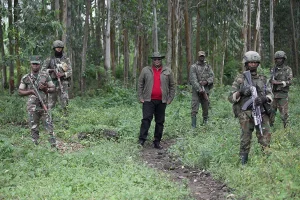By CMP News Desk The March 23 Movement, commonly known as M23, originated in 2012 when a faction of the Congolese army mutinied, accusing the DRC government of violating a 2009 peace agreement. Predominantly composed of Tutsi fighters, the group captured international attention by briefly seizing Goma, the capital of North Kivu province, before being pushed back by a joint effort of Congolese and UN forces in 2013. After years of dormancy, M23 resurfaced in 2021, claiming to fight for the rights of marginalized communities in eastern Congo. In his interview, Bisimwa portrayed M23 as a group struggling for survival in a volatile region plagued by decades of ethnic tensions, weak governance, and competition over natural resources. “Our fight is not one of aggression but one for our very existence,” Bisimwa stated. He argued that the Congolese government’s military campaigns against the group have left them with no choice but to defend themselves and their communities. This narrative has been met with skepticism from human rights organizations, which accuse M23 of committing atrocities against civilians, including killings, looting, and forced displacement. The United Nations reports that over 800,000 people have been displaced in North Kivu province since M23’s resurgence, exacerbating an already dire humanitarian crisis. Bisimwa emphasized that M23 is open to dialogue, calling on both the Congolese government and regional actors to engage in peace talks. “We want dialogue. We believe that only through negotiation can we bring lasting peace to our people,” he said. However, the DRC government has consistently dismissed M23 as a terrorist organization, refusing to engage with the group. President Félix Tshisekedi’s administration has accused M23 of being backed by neighboring Rwanda, a claim Kigali denies. This allegation has strained relations between the two countries, with both trading accusations of harboring armed groups that destabilize the region. The conflict in eastern Congo has drawn condemnation from international organizations, including the United Nations, the African Union, and human rights groups such as Amnesty International and Human Rights Watch. The International Criminal Court (ICC) has also been called upon to investigate alleged war crimes and crimes against humanity committed by all parties involved in the conflict. The UN peacekeeping mission in the DRC (MONUSCO) has faced criticism for its perceived inability to protect civilians. Protests against MONUSCO have erupted in several Congolese cities, with locals demanding greater accountability and effectiveness from the mission. The humanitarian impact of the conflict continues to mount. According to UN reports, over 6 million people are displaced across the DRC, making it one of the world’s largest displacement crises. In North Kivu alone, access to food, healthcare, and basic services has been severely disrupted. Aid organizations have warned of a looming famine if immediate action is not taken. As the conflict escalates, calls for a peaceful resolution grow louder. Regional leaders, including those from the East African Community (EAC), have initiated peace processes, though tangible results remain elusive. Observers argue that a sustainable solution will require addressing the root causes of the conflict, including land disputes, ethnic divisions, and economic exploitation. The international community’s role will also be pivotal in facilitating dialogue and holding accountable those responsible for atrocities. However, the path to peace remains fraught with challenges, as mistrust and competing interests continue to undermine efforts. Bertrand Bisimwa’s plea for dialogue underscores the complexity of the conflict in eastern DRC. While M23’s actions have drawn widespread condemnation, their calls for negotiation highlight the urgent need for a comprehensive and inclusive approach to resolving the crisis. Whether the Congolese government and regional actors will respond to these overtures remains uncertain, but the stakes for millions of civilians caught in the crossfire could not be higher.
In a recent interview with Al Jazeera, Bertrand Bisimwa, the leader of the M23 rebel group, has described the ongoing conflict in eastern Democratic Republic of Congo (DRC) as a “fight for survival.” Bisimwa insists that M23 is committed to seeking dialogue to end the decades-long instability in the region. His remarks come amidst heightened violence and increasing international scrutiny of the conflict
